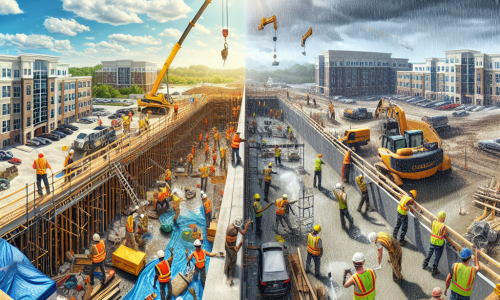Understanding and obtaining the right permits is essential for any construction or renovation project in Delaware. Building permits ensure compliance with safety codes, zoning laws, and environmental regulations, protecting both property owners and the community. This guide outlines the significance of building permits, key permits required, the step-by-step process to secure approvals, expected timelines, and practical tips to streamline the process. Whether you’re planning a small renovation or a large-scale development, following the proper procedures will help you avoid legal issues and keep your project on track. Understanding Building Permits A building permit is a legal authorization from the local government that allows the construction or renovation of a project to begin officially. Whether it’s the construction of a new project or a modification, gaining a permit ensures compliance with zoning laws, safety regulations, and construction codes. Before initiating construction, contractors or organizations must submit an application outlining their project. The application then gets reviewed to confirm it meets all the required guidelines. Once your application is approved, the construction process can start, however, most require periodic inspections to verify adherence to local standards. The Significance of Building Permits in Delaware A building permit is a fundamental requirement for constructing new buildings or modifying existing structures in Delaware. The building permit aims to ensure that all the required processes align with the necessary safety codes and regulations. This helps to safeguard both property owners and the community. Failure to follow the required permit guidelines can result in major problems such as legal consequences, penalties, and removal of unauthorized structures. One of the major advantages of gaining a building permit is securing structural protection. The permit guidelines include some important inspections at different stages of the construction, enabling professionals to effectively identify and address potential risks. This helps extend the lifespan of a structure while also reducing risks to occupants and neighboring properties. Aligning with building code guidelines protects projects from accidents or structural failures. Building permits in Delaware help enforce zoning laws that regulate land use and urban planning. These regulations ensure that new constructions align with existing community layouts, preserving the character and functionality of neighborhoods. Adhering to zoning laws prevents issues like overcrowding, environmental harm, and disruptions to infrastructure planning. Additionally, developers who follow proper permit procedures contribute to responsible growth and sustainable development in Delaware. From a financial standpoint, obtaining a building permit protects property owners in the long run. Unauthorized construction can lead to costly corrections, fines, and potential legal disputes. Moreover, when selling a property, having a documented permit history reassures buyers that all modifications were legally approved and meet current standards. This transparency enhances the property’s market value and prevents complications during real estate transactions. Ultimately, building permits are not just bureaucratic requirements—they are essential safeguards that promote safety, compliance, and long-term property value. By securing the necessary permits before starting a project, homeowners and developers can ensure their investments remain protected while contributing to a well-regulated and sustainable built environment. Key Permits and Licenses Required in Delaware When undertaking a construction project in Delaware, obtaining the necessary permits and approvals is crucial to ensure compliance with state and local regulations. Below is an overview of essential permits required for building projects. 1. Building Permit Gaining a building permit is essential for most projects such as new building construction, renovation and structural changes of any existing projects. It aims to comply with Delaware State Building Codes and local regulations Required Documents: Architectural plans, site plans, structural reports, energy compliance documents, and a completed application. Where to Apply: City or county Building Department (New Castle, Kent, or Sussex County). 2. Zoning Permit Zoning permits ensure that construction projects comply with regulations regarding land use, building height, and property setbacks in Delaware. Required Documents: Site plan, zoning application, and possible neighborhood impact assessment. Where to Apply: City or county Zoning Department. 3. Environmental Review Projects that might have potential environmental impact must go through a review process to adhere to the Delaware Environmental Protection Act. Required Documents: Environmental impact assessment, site plan, and mitigation plans. Where to Apply: Delaware Department of Natural Resources and Environmental Control (DNREC) or the local Environmental Services Division. 4. Coastal Zone Permit For most projects in Delaware’s Coastal Zone, this permit aims to ensure adherence with Coastal Zone Act guidelines to protect natural resources safety. Required Documents: Coastal site plan, environmental assessment, and completed application. Where to Apply: Delaware Coastal Programs Office under DNREC. 5. Electrical Permit This is another crucial permit needed for any installation, alteration or repair of electrical systems. This permit aims to ensure compliance with the National Electrical Code (NEC). Required Documents: Electrical plans and a completed application. Where to Apply: City or county Building Department. 6. Plumbing Permit Necessary for plumbing system installations, alterations, or repairs, including water, sewer, and gas lines, by the Delaware Plumbing Code. Required Documents: Plumbing plans and a completed application. Where to Apply: City or county Building Department. 7. Mechanical Permit Required for HVAC system work, ensuring safety and efficiency standards per the Delaware Mechanical Code. Required Documents: Mechanical plans, energy compliance documents, and a completed application. Where to Apply: City or county Building Department. 8. Fire Department Approval Mandatory for commercial projects and large residential developments to ensure compliance with fire safety regulations. Required Documents: Fire safety plans and a completed application. Where to Apply: Local Fire Marshal’s Office or Delaware State Fire Marshal. 9. Floodplain Development Permit If a project is in a floodplain, this permit ensures compliance with the National Flood Insurance Program (NFIP) and local floodplain regulations. Required Documents: Floodplain development plan, elevation certificate, and site plan. Where to Apply: City or county Engineering Department. Ensuring you have the necessary permits before beginning construction can prevent legal issues and ensure your project runs smoothly while meeting safety and environmental standards. Steps to Obtain Permits and Licenses for Construction in Delaware Navigating the permitting process is essential to ensure your construction project complies with local and state
Breaking News






